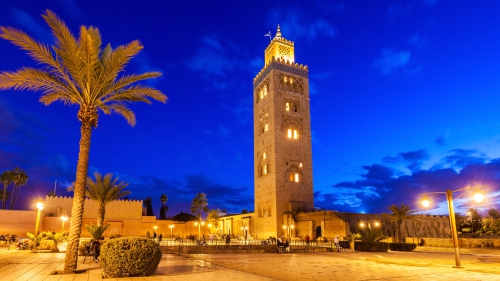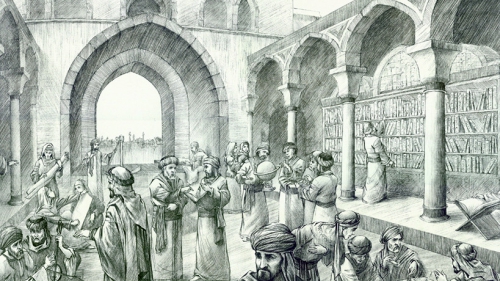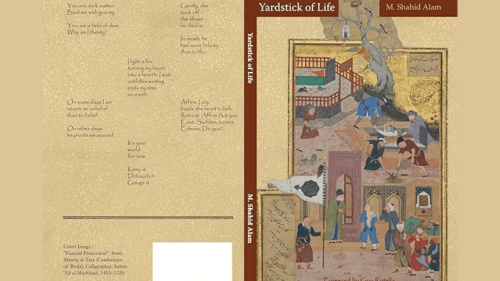Islam and Modernity

Modernity signifies "both a historical period as well as the ensemble of particular socio-cultural norms, attitudes and practices that arose in post-medieval Europe and have developed since, in various ways and at various times, around the world. While it includes a wide range of interrelated historical processes and cultural phenomena, it can also refer to the subjective or existential experience of the conditions they produce, and their ongoing impact on human culture, institutions, and politics." 1
Modernity is the quality of being modern, contemporary or up-to-date, implying a modern or contemporary way of living or thinking. Modernity is often depicted as a period marked by a questioning or rejection of tradition and its normative uniformity as well as structural homogeneity, in favor of such novel or burgeoning standards and systems as rationalism, personal freedom, individualism, social, scientific and technological progress, industrialization, professionalization, secularization, representative democracy, public education, etc. At the heart of modernity stand cultural and intellectual self-realization, self-consciousness and re-birth, that is, deliverance and liberation from the fetters of Middle Ages stained with ignorance and superstition, and when the voice of religious authorities was imposed over personal experience and rational activity. Hence, the appellations of some of the major cultural, intellectual, social and philosophical currents of the day, especially those of the early modern period from the 15th to the 18th centuries, featured such catchy terms as re-birth, reason, enlightenment, discovery, revolution, etc., so as to unmistakably draw attention to the omnipresent exuberance.
The word modern comes from the Latin words modo, meaning just now, and modus, meaning now, but the term modernity has a stronger meaning, suggesting the possibility of a new beginning based on human autonomy and the consciousness of the legitimacy of the present time. Modernity is also said to imply that everything is open to query and to testing; everything is subject to rational scrutiny and refuted by argument.2 While the term modernity was firstly coined in the 19th century, the first known use of the adjective modern was in the late 16th century.3 However, according to some, the first use of the term modern goes back to the early Christian Church in the 5th century when it was used to distinguish the Christian era from the pagan age. However, the term did not gain widespread currency until the 17th century.4
The initial emergence of the concepts of tradition, modern and modernity had nothing to do with Islamic scholarship and the world of Islam. However, since one of the most important features of the early European modern period was its globalized character, the Islamic world, which never ceased its close cultural, social and military interactions with the West, was quickly affected by the large-scale changes that were sweeping across Europe. The matter was further exacerbated by the fact that while the Western world was in its dramatic cultural and intellectual ascendancy, the Islamic world was in its as dramatic and swift decadence. One of the most painful corollaries of those developments was the subsequent colonization of Muslim Land by the leading Western Powers. Thus, insatiable quest for modernity in Europe turned for Muslims into colonization, and the latter soon became a lengthy process of Westernization of Islamic personality and culture. Consequently, there has been a tendency in the Islamic world since the late 19th century to explore more systematically the prevalent calamity and try to put forth some comprehensive, authoritative and well-structured solutions.
As a result, what could be called Islamic modernism emerged in the middle of the 19th century as a response to European colonialism. Islamic modernism was a movement that aimed to reconcile Islamic faith with some modern values and trends such as democracy, rights, nationalism, rationality, science, equality and progress. As explained by Tauseef Ahmad Parray, it "generated a series of novel institutions, including schools that combined Islamic education with modern subjects and pedagogies; newspapers that carried modernist Islamic ideas across continents; constitutions that sought to limit state power; and social welfare agencies that brought state power into even more sectors of social life. Thus, Islamic modernism began as a response of Muslim intellectuals to European modernity, who argued that Islam, science and progress, revelation and reason, were indeed compatible. They did not simply wish to restore the beliefs and practices of the past; rather they asserted the need to 'reinterpret and reapply' the principles and ideals of Islam to formulate new responses to the political, scientific and cultural challenges of the west and of modern life. In a nutshell, as a reaction to the penetration of Western capitalist modernity into all aspects of Muslim society from the Arab world to Southeast Asia, a significant number of Muslim intellectuals began to write down the general outlines of a new intellectual project that is often referred to as 'Islamic modernism'." 5
As part of a natural and dynamic development of societies, which in turn is part of sunnatullah (Allah's patterns and laws according to which He deals with His creation), modernity as new, often creative and more functional, productive and effective, modes of living is not at all to be projected as at odds with Islam and its views of life and its multi-tiered realities. Modernity, in the sense of coming fully to terms with the maxims of "being at this time", "being new" and "now existing" and whatever conceptual and practical nuances they implied, indicates attempts to come to grips with the rapid socio-political, economic and scientific changes, especially in the Western hemisphere, which however soon assumed a global character and thus caught many societies, in particular those of the Muslim world, by surprise. Modernity quickly emerged as the most compelling world's life spectacle. It emerged and was there to stay, absorbing and assimilating if it was not absorbed and assimilated. There were other forms of "modernity" in the past, so to speak, originating in different parts of the world, nevertheless there was never anything as profound, all-inclusive, avant-garde and engaging as the latest modernity experience. Proclivities for being modern thus meant pragmatism and realism as opposed to idealism and naivety, dynamism and drive as opposed to apathy and indolence, and being open-minded and both present and future-oriented rather than myopic, narrow-minded and trapped in a single and static moment of time.
As far as Islam, Muslims and the Muslim mind were concerned, however, the biggest dilemma posed by modernity was that those new experiences of the world led to the development of a new sense of self, of subjectivity and individuality, which in turn led to fundamental changes in the understanding of the relationships between man and the supernatural, man and the natural world, man and his self, and between man and other people. In other words, the development of modernity was coupled with the development of new ideas, thoughts, values, standards, beliefs, lifestyles and tendencies. It stood for the creation of new ideologies and worldviews that called for a rapture, a revolution in time, and a break with the past and its principally outmoded ideologies and worldviews. As Ron Eyermon explains, "modernity referred to a world constructed anew through the active and conscious intervention of actors and the new sense of self that such active intervention and responsibility entailed. In modern society the world is experienced as a human construction, an experience that gives rise both to an exhilarating sense of freedom and possibility and to a basic anxiety about the openness of the future." 6
The Muslim dilemma thus revolved around the thrust of integrating the major and most inevitable segments of the increasingly omnipresent and universal modernity wonder into the fabric of ailing Islamic culture and civilization without compromising the transcendent values, teachings and principles of Islam and its worldview in the process. The proponents of such an undertaking were torn between the unavoidability of the spread of the spill of modernity and the Islamic insistent denunciation of new inventions in religion, stressing that all inventions (in religion) are (religious) innovations (bid'ah), and each innovation is a misguidance, and every misguidance is Hell-bound. However, it swiftly became obvious that striking a delicate balance between the two poles was the best and in the long-term most realistic answer. Neither fully embracing and incorporating modernity without distilling and Islamizing it, and adjusting it to the subtle religious, socio-political and economic requirements of Islamic societies, nor completely turning it down on the grounds that it was utterly un-Islamic and bent on destroying Islamic tradition and heritage, was the right and feasible way.
This was so, furthermore, because Islam as the universal and final revelation to mankind is both traditional and modern. While it speaks about the infinity, permanence and inviolability of its divinely prescribed truth, and so, about continuous complying with and following its authorities, as well as about valuing and conforming to the legacies and traditions spawned by such dynamic historical processes, Islam also calls for appropriate responses to the incessant challenges presented by the fluctuating time and space factors, and for the prospect of its understanding and application to be reinvigorated and reformed from within in order to counter the potential weaknesses of the Muslim mind and the cultural and civilizational degeneration of Islamic societies. Accordingly, such concepts as ijtihad (independent reasoning) for solving new and unprecedented issues and challenges, islah (reform), tajdid (renewal), rejection of all types of religious innovations (bid'ah), and sahwah (awakening), have been expounded and duly articulated in Islamic scholarship.
Finally, Muslims need not have any undue aversion to Islamic tradition because Islam was never a cause of any darkness or ignorance chapters in Muslim history. There were no dark ages in Islamic civilization. Such a thing would be an anomaly in a religion of ultimate light, truth and guidance for humankind as Islam is. On the contrary, Islam was the root-cause of all goodness that originated in Islamic civilization and from which not only Muslims, but also non-Muslims, benefitted. It was only certain Muslims' recurring misconduct that time after time held up the progression of Islamic civilization, in the end causing it to come to a standstill. The problems thus were never Islam's, but rather Muslims'. The same holds true for the latest conundrum with regard to the notions of tradition and modernity and what relationship ought to exist between them.
In the same vein, Muslims need not have any unwarranted or worship-like reverence for Western modernity crusade because, in essence, conceptually and epistemologically it was so conceived as to correspond to the immediate Western needs created by the Western Middle Ages or Medieval period. It was only later that by means of colonization and westernization drives, modernity came to be perceived and witnessed as a global phenomenon. While its outward manifestations and operations seem customarily innocent and universally appealing, it is the inner philosophical dimensions of modernity, as well as the former's everyday application entailing a myriad of ethical quandaries - which are often deceptively wrapped up in the wrap of supposed universal values drawn from such spheres of human value as encompass aesthetic preference, social order and overall human traits and endeavor - that prove the biggest impediment to unconditionally recognizing and espousing modernity. Muslim spiritual and intellectual awareness thus ought always to be of such a high level and quality that knowing how far to go, where to stop and what to take, or contribute, and what not, when engaging with various constituents of modernity, should be a comfortably manageable proposition.
While discoursing about the theme of the relationship between the Islamic worldview and modern science, Seyyed Hossein Nasr underlined in the context of his critique of modernity and its science: "Instead of criticizing the implicit value system inherent in modern science from the Islamic point of view, many of the champions of the blind emulation of modern science and technology claim that it is value-free, displaying their ignorance of a whole generation of Western philosophers and critics of modern science who have displayed with irrefutable arguments the fact that modern science, like any other science, is based on the particular value system and a specific worldview rooted in specific assumptions concerning the nature of physical reality, the subject who knows this external reality, and the relation between the two. Modern science must be studied in its philosophical foundations from the Islamic point of view, in order to reveal for Muslims exactly what is the value system upon which it is based and how this value system opposes, complements, or threatens the Islamic value system which for Muslims comes from God and not simply merely human forms of knowledge which are based by definition upon human reason and the five external senses, and specifically denying any other possible avenue for authentic knowledge. Muslim thinkers must stop speaking of modern physics as not being Western but international, while hiding its provincial foundations grounded in a particular philosophy and value system related to a specific period of not global, but European history." 7
Moreover, when he in the same study dwelled on the steps in the creation of an authentic Islamic science, Seyyed Hossein Nasr strongly advised that "the first necessary step is to stop the worship-like attitude towards modern science and technology which is prevalent today in much of the Muslim world . . . This trend must be reversed and the whole of modern science and technology be seen not with a sense of inferiority complex as if a frog were looking into the eyes of a viper, but from an independent Islamic worldview whose roots are sunk in Allah's revelation and which could be compared to the case of an eagle who roams the horizons and studies the movements of the viper without being mesmerized by it. In the light of this worldview, the whole notion of decadence in Islamic civilization, especially as far as it concerns the sciences, must be re-examined." 8
========
Notes:
1. Modernity, http://en.wikipedia.org/wiki/Modernity (accessed on June 11, 2015).
2. Gerard Delanty, Modernity, http://www.sociologyencyclopedia.com/public/tocnode?query=modernity&widen=1&result_number=2&from=search&id=g9781405124331_yr2014_chunk_g978140512433119_ss1-117&type=std&fuzzy=0&slop=1 (accessed on June 11, 2015).
3. Modernity, http://www.merriam-webster.com/dictionary/modern (accessed on June 11, 2015).
4. Gerard Delanty, Modernity, http://www.sociologyencyclopedia.com/public/tocnode?query=modernity&widen=1&result_number=2&from=search&id=g9781405124331_yr2014_chunk_g978140512433119_ss1-117&type=std&fuzzy=0&slop=1 (accessed on June 11, 2015).
5. Tauseef Ahmad Parray, Islamic Modernist and Reformist Thought: A Study of the Contribution of Sir Sayyid and Muhammad Iqbal, World Journal of Islamic History and Civilization, 1 (2): 79-93, 2011, IDOSI Publications, 2011.
6. Ron Eyerman, Modernity and Social Movements, inside "Social Change and Modernity", edited by Hans Haferkamp and Neil J. Smelser, (Barkley: University of California Press, 1992), p. 38-39.
7. Seyyed Hossein Nasr, The Islamic Worldview and Modern Science, inside "Islamic Quarterly", vol. 39, no. 2, 1995, p. 75.
Related Suggestions

















